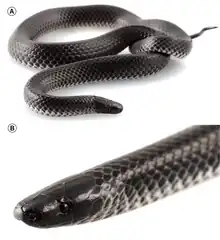| Geophis[1] | |||
| Wagler, 1830[2] | |||
 | |||
| Systematyka | |||
| Domena | |||
|---|---|---|---|
| Królestwo | |||
| Typ | |||
| Podtyp | |||
| Gromada | |||
| Podgromada | |||
| Rząd | |||
| Podrząd | |||
| Infrarząd | |||
| Nadrodzina |
Colubroidea | ||
| Rodzina | |||
| Podrodzina | |||
| Rodzaj |
Geophis | ||
| Typ nomenklatoryczny | |||
|
Catostoma chalybaeum Wagler, 1830 | |||
| Synonimy | |||
|
| |||
| Gatunki | |||
| |||
Geophis – rodzaj węży z podrodziny Dipsadinae w rodzinie połozowatych (Colubridae).
Zasięg występowania
Rodzaj obejmuje gatunki występujące w Meksyku, Gwatemali, Salwadorze, Hondurasie, Nikaragui, Kostaryce, Panamie i Kolumbii[10].
Systematyka
Etymologia
- Catostoma: gr. κατω katō „na dół, w dół, poniżej”; στομα stoma, στοματος stomatos „usta”[3].
- Geophis: gr. γεω- geō- „ziemny-”, od γη gē „ziemia, grunt”[11]; οφις ophis, οφεως opheōs „wąż”[12]. Nowa nazwa dla Catostoma Wagler, 1830.
- Rabdosoma: gr. ῥαβδος rhabdos „pręt”; σωμα sōma, σωματος sōmatos „ciało”[4]. Gatunek typowy: Rabdosoma semidoliatum A.M.C. Duméril, Bibron & A.H.A. Duméril, 1854.
- Colobognathus: gr. κολοβος kolobos „okaleczony, pozbawiony czegoś”[13]; γναθος gnathos „żuchwa”[14]. Gatunek typowy: Colobognathus hoffmanni Peters, 1859.
- Geophidium: gr. γεω- geō- „ziemny-”, od γη gē „ziemia, grunt”[11]; οφιδιον ophidion „mały wąż”, zdrobnienie od οφις ophis, οφεως opheōs „wąż”[12]. Gatunek typowy: Geophidium dubium Peters, 1861.
- Colophrys: gr. κολος kolos „krótki, obcięty”[15]; οφρυς ophrus, οφρυος ophruos „brew”[12]. Gatunek typowy: Colophrys rhodogaster Cope, 1868.
- Parageophis: gr. παρα para „blisko”[16]; rodzaj Geophis Wagler, 1830. Gatunek typowy: Rabdosoma semidoliatum A.M.C. Duméril, Bibron & A.H.A. Duméril, 1854.
- Dirosema: gr. δειρη deirē „szyja”[15]; σημα sēma, σηματος sēmatos „znak, znamię”[17]. Gatunek typowy: Geophis bicolor Günther, 1868.
Podział systematyczny
Do rodzaju należą następujące gatunki[10]:
- Geophis anocularis
- Geophis bellus
- Geophis betaniensis
- Geophis bicolor
- Geophis blanchardi
- Geophis brachycephalus
- Geophis cancellatus
- Geophis carinosus
- Geophis chalybeus
- Geophis championi
- Geophis damiani
- Geophis downsi
- Geophis dubius
- Geophis duellmani
- Geophis dugesii
- Geophis dunni
- Geophis fulvoguttatus
- Geophis godmani
- Geophis hoffmanni
- Geophis immaculatus
- Geophis incomptus
- Geophis isthmicus
- Geophis juarezi
- Geophis juliai
- Geophis laticinctus
- Geophis laticollaris
- Geophis latifrontalis
- Geophis lorancai
- Geophis maculiferus
- Geophis mutitorques
- Geophis nasalis
- Geophis nephodrymus
- Geophis nigroalbus
- Geophis nigrocinctus
- Geophis occabus
- Geophis omiltemanus
- Geophis petersii
- Geophis pyburni
- Geophis rhodogaster
- Geophis rostralis
- Geophis russatus
- Geophis ruthveni
- Geophis sallaei
- Geophis semidoliatus
- Geophis sieboldi
- Geophis talamancae
- Geophis tarascae
- Geophis tectus
- Geophis turbidus
- Geophis zeledoni
Przypisy
- ↑ Geophis, [w:] Integrated Taxonomic Information System (ang.).
- ↑ Wagler 1830 ↓, s. 342.
- 1 2 Wagler 1830 ↓, s. 194.
- 1 2 A.M.C. Duméril. Prodrome de la classification des reptiles ophidiens. „Mémoires de l’Académie des sciences de l’Institut de France”. 23, s. 440, 1853. (fr.).
- ↑ W. Peters. Über die von Hrn. Dr. Hoffmann in Costa Rica gesammelten und an das Königl. zoologische Museum gesandten Schlangen. „Monatsberichte der Königlichen Preussische Akademie des Wissenschaften zu Berlin”. Aus dem Jahre 1859, s. 275, 1860. (niem.).
- ↑ W. Peters. Über neue Schlangen des Königl. zoologischen Museums: Typhlops striolatus, Geophidium dubium, Streptophorus (Ninia) maculatus, Elaps hippocrepis. „Monatsberichte der Königlichen Preussische Akademie des Wissenschaften zu Berlin”. Aus dem Jahre 1861 (2), s. 922, 923, 1862. (niem.).
- ↑ E.D. Cope. An examination of the Reptilia and Batrachia obtained by the Orton Expedition to Equador and the Upper Amazon, with notes on other species. „Proceedings of the Academy of Natural Sciences of Philadelphia”. 20, s. 130, 1868. (ang.).
- ↑ M.-F. Bocourt: Etudes sur les reptiles. W: H. Milne-Edwards & L. Vaillant: Mission scientifique au Mexique et dans l’Amérique Centrale: ouvrage publié par ordre de S.M. l’Empereur et par les soins du Ministre de l’instruction publique. Cz. 3. Paris: Imprimerie impériale, 1883, s. 534. (fr.).
- ↑ G.A. Boulenger: Catalogue of the snakes in the British Museum (Natural History). Cz. 2: Containing the conclusion op the Colubridæ Aglyphæ. London: The Trustees, 1894, s. 298. (ang.).
- 1 2 P. Uetz & J. Hallermann: Genus: Geophis. The Reptile Database. [dostęp 2019-05-17]. (ang.).
- 1 2 Jaeger 1944 ↓, s. 95.
- 1 2 3 Jaeger 1944 ↓, s. 154.
- ↑ Jaeger 1944 ↓, s. 56.
- ↑ Jaeger 1944 ↓, s. 98.
- 1 2 colopteryx, [w:] The Key to Scientific Names, J.A. Jobling (red.), [w:] Birds of the World, S.M. Billerman et al. (red.), Cornell Lab of Ornithology, Ithaca [dostęp 2021-12-27] (ang.).
- ↑ Jaeger 1944 ↓, s. 161.
- ↑ Jaeger 1944 ↓, s. 209.
Bibliografia
- J.G. Wagler: Natürliches System der Amphibien, mit vorangehender Classification der Säugethiere und Vögel. Ein Beitrag zur vergleichenden Zoologie. München, Stuttgart und Tübingen: In der J.G. Cotta’scchen Buchhandlung, 1830, s. 1–342. (niem.).
- Edmund C. Jaeger, Source-book of biological names and terms, wyd. 1, Springfield: Charles C. Thomas, 1944, s. 1–256, OCLC 637083062 (ang.).
This article is issued from Wikipedia. The text is licensed under Creative Commons - Attribution - Sharealike. Additional terms may apply for the media files.